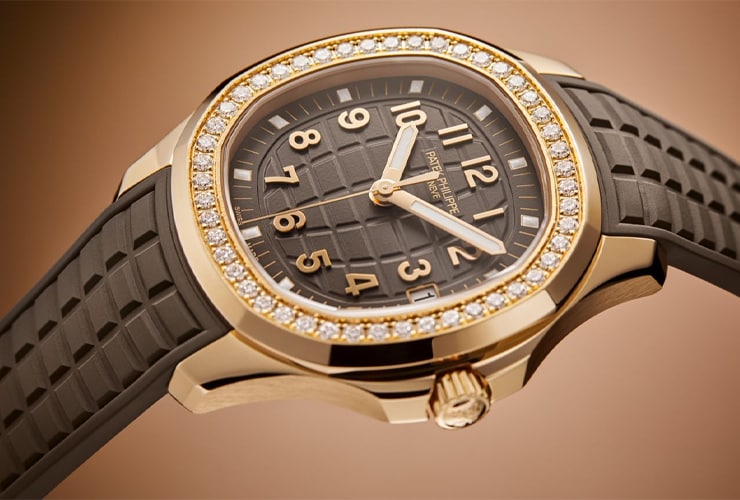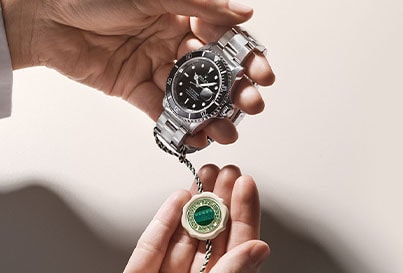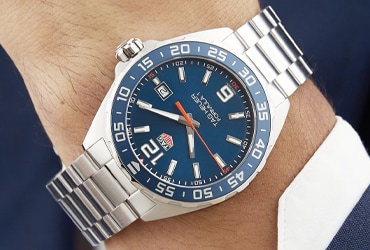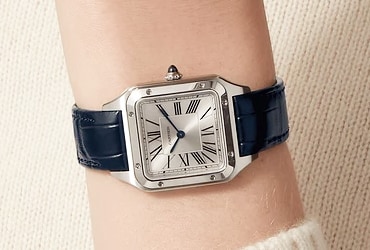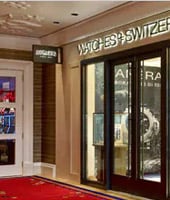Beyond the Bezel: OMEGA Heritage and Milestones
By Sarah Jayne Potter | 6 minute read
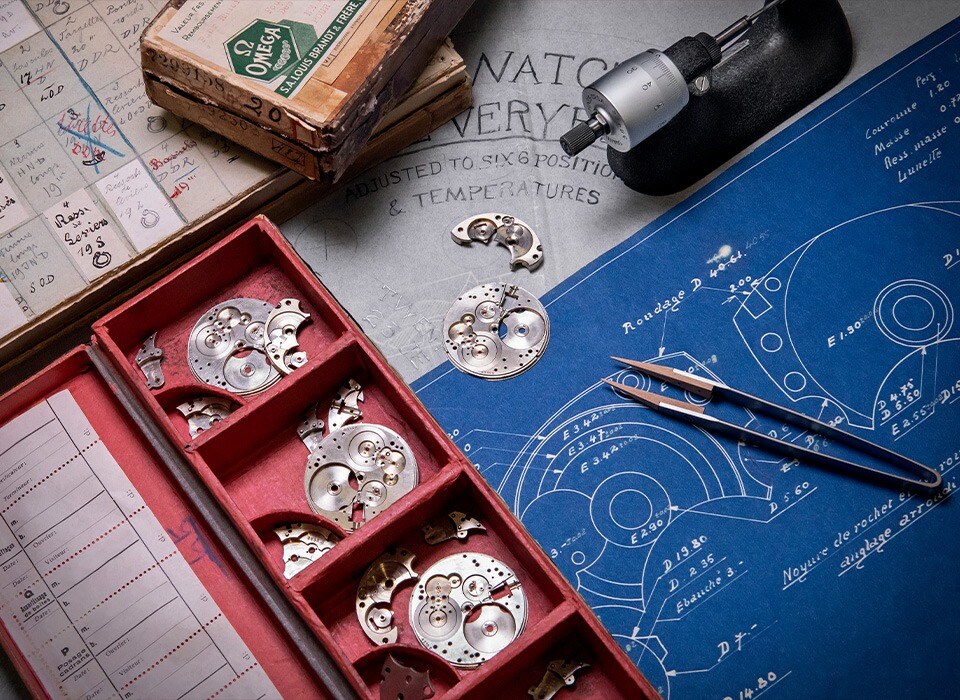
The OMEGA brand is synonymous with innovation, but even the most dedicated collectors may be unaware of some of its greatest achievements. Started by a young watchmaker in a small Swiss village in the 1840s, it is now one of the most esteemed names in luxury horology. Here we look at how it went from the depths of the oceans to outer space and explore the pioneering spirit of innovation that continues to make OMEGA the brand it is today.
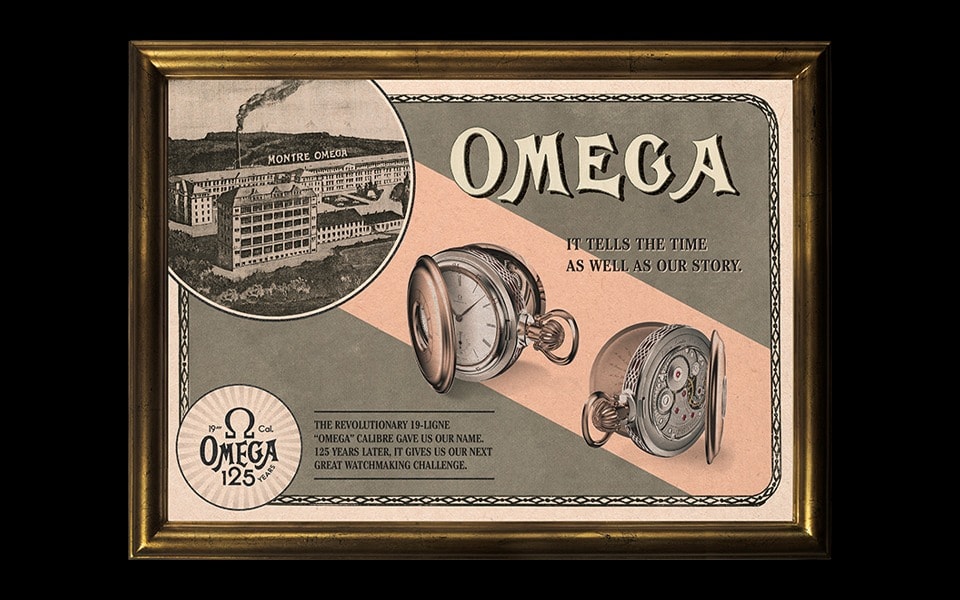
The heritage of OMEGA
The brand that would become OMEGA began in 1848 when a 23-year-old watchmaker called Louis Brandt opened his first workshop in La Chaux-de-Fonds. His aim was to create highly accurate timepieces, and he passed this passion on to his sons, Louis-Paul and César, who took the reins of the business following their father’s death in 1879. Their first series-produced calibre was a success when it appeared in 1885, and it laid the foundation for them to create the world’s first minute-repeating wristwatch. This miniaturised version of existing pocket-watch movements chimed hours and minutes on demand and was an impressive achievement on its world premiere in 1892.
Created by the Brandts in 1894, the pioneering 19-ligne calibre was one of the very first Swiss watch movement that was designed to be produced on an industrial scale. Every component of the movement could be replaced, without modification, by any watchmaker in the world. The brothers named the movement after the last letter of the Greek alphabet, to symbolise both ultimate accomplishment and the ‘final word’ in accuracy and reliability. Following the movement’s success, the entire company was renamed OMEGA Watch Co in 1903.
Today, OMEGA continues to innovate and develop highly accurate timepieces. In 2019, the watchmaker celebrated 125 years of the OMEGA name – and that famous branding can still be seen everywhere from the red carpet to the starting blocks.
You can listen to our podcast with Nick Foulkes discussing the history of OMEGA on Calibre Online here.
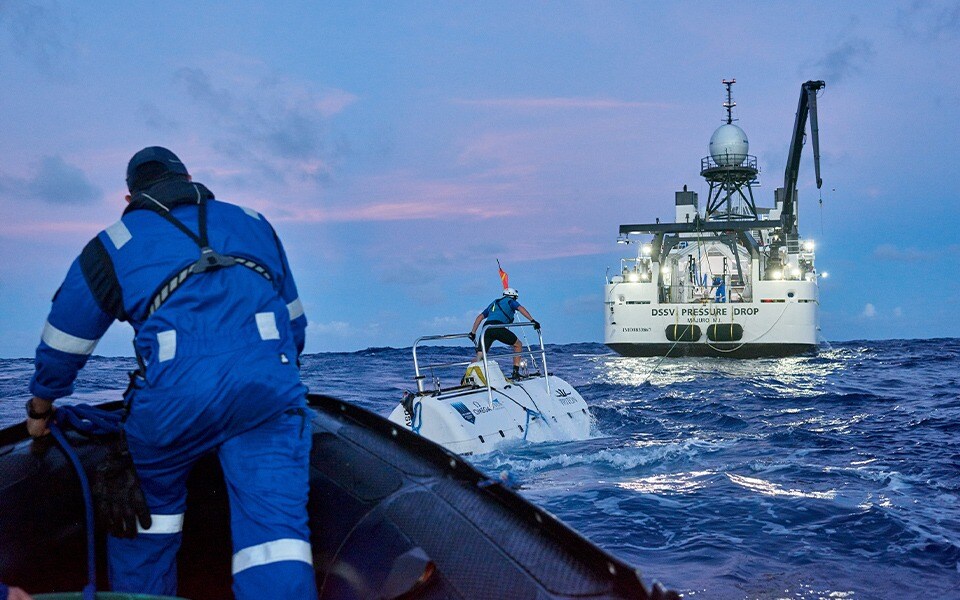
Seamaster Planet Ocean Ultra Deep Professional
Since the turn of the century, OMEGA has continued to break records – such as in early 2019, when the Seamaster Planet Ocean Ultra Deep Professional set a new world-record depth for a dive watch. Adventurer Victor Vescovo strapped prototypes of the watch to the robot arms and a detachable ‘lander’ on his submersible before diving 10,925m to the bottom of the Mariana Trench. After a four-and-a-half-hour descent, he reached the deepest point on Earth, where the Seamaster’s sapphire crystal had to sustain approximately 16.5 tonnes of pressure. One of the watches spent 54 hours at that depth, yet when it was retrieved, it had lost less than a second of time.
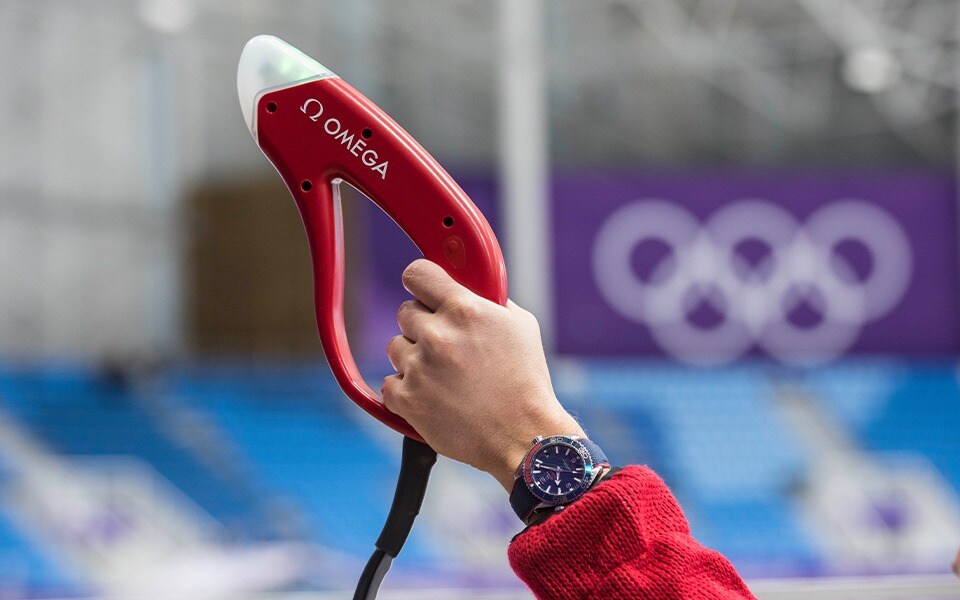
Official Timekeeper for major sporting events
As it expanded, OMEGA retained its reputation for accuracy and as early as 1905, it was taking on the role of official timekeeper at sporting events both at home in Switzerland and abroad. The brand was gaining global recognition for quality, and by the end of 1909 it had enlarged its distribution network to cover all six continents. Then, in 1931, an OMEGA chronometer set precision records in all six of the famously stringent chronometry trials held at the Geneva Observatory, keeping time more accurately in a range of conditions than any watch previously produced.
A year after this historic success, OMEGA became the first watchmaker to take on timing duties for an entire Olympics. A lone Swiss watchmaker arrived at the 1932 Los Angeles Games with 30 split-seconds chronographs and was entrusted to time all competition across the event’s many disciplines. Today, the Swiss brand remains the Official Timekeeper of the Olympic and Paralympic Games and has improved sports timekeeping from 1/10th of a second to 1/1,000th of a second through its pioneering innovations.
Serving the military
OMEGA is also famed for its historic links with the military. In 1940 it was commissioned as the single largest supplier of watches for the British Armed Forces and its allies. This relationship inspired one of OMEGA’s biggest collections: the Seamaster, launched in 1948 marking the brands centenary, was based on watches used by the Navy throughout the war. The design, recognised for its rugged reliability and superior water resistance, became a favourite among Britain’s naval officers. The Seamaster was also the starting point for the brand’s ‘professional’ line of watches, launched nine years later with a trio of designs – the Speedmaster, Seamaster 300 and Railmaster – that are still iconic to this day.
Like the Seamaster, the Railmaster has strong military connections, as it was derived from a WWII specification from the British Ministry of Defence for pilots’ wristwatches with increased resistance to magnetism. This led OMEGA to experiment with a series of new anti-magnetic prototype movements protected by Faraday cages. The 1957 Railmaster was a direct result of this: aimed at scientists and electrical engineers, it provided resistance up to 1000 gauss. Today’s Railmaster is 15 times more resistant and can withstand fields up to 15,000 gauss.
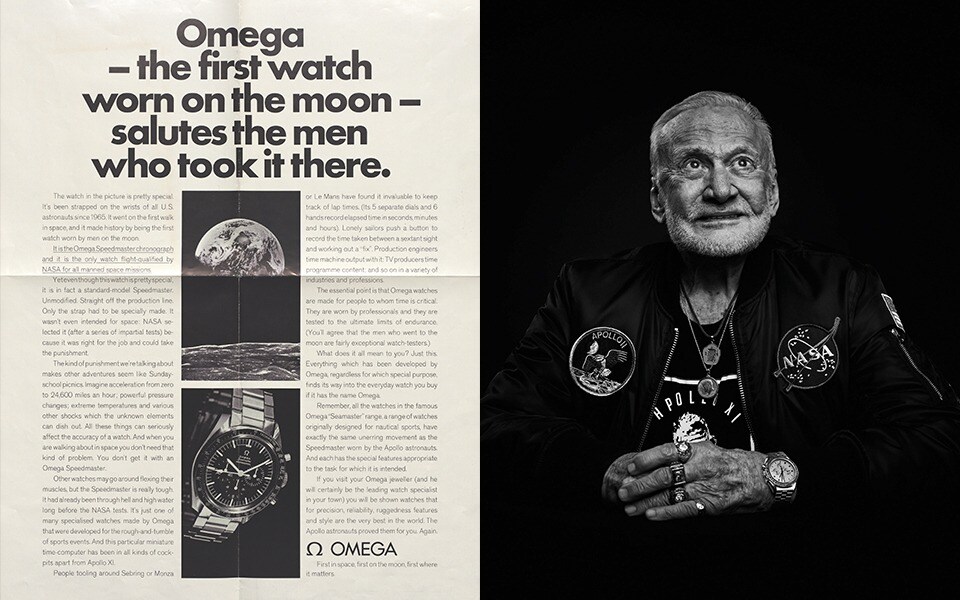
OMEGA Speedmaster 'Moonwatch'
The Speedmaster, later dubbed the Moonwatch, was the only watch to survive NASA’s rigorous tests for the likes of temperature, vibration, and shock during trials for a timekeeper to assist on their space missions. These experiments were designed to simulate a space launch and test the durability of the mechanisms of various watches. In fact, a Speedmaster had already been to space on the wrist of Wally Schirra, an American astronaut, during the Mercury Sigma 7 mission in 1962. The watch was declared ‘Flight Qualified for all Manned Space Missions’ three years later, and was used for all six lunar missions. The Speedmaster is perhaps best known for being worn by both Buzz Aldrin and Neil Armstrong during the Apollo 11 lunar landing.
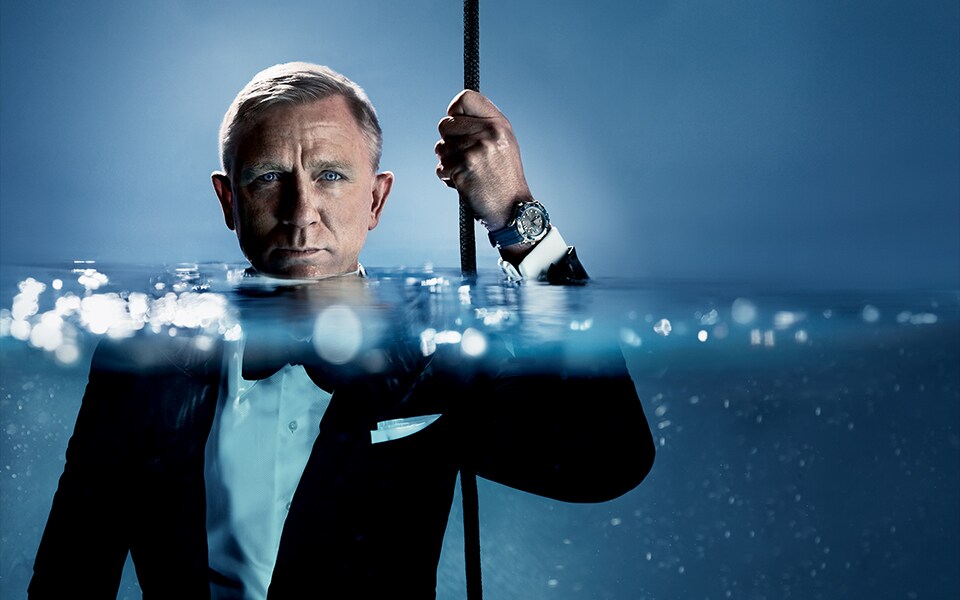
Association with James Bond
Among its many film appearances, OMEGA is recognised for regularly appearing on the wrist of the world’s favourite secret agent, James Bond. Despite original author Ian Fleming writing of 007’s ‘heavy Rolex Oyster’, Oscar-winning Bond costume designer Lindy Hemming said: ‘I was convinced that Commander Bond, a naval man, a diver and a discreet gentleman of the world, would wear the Seamaster with the blue dial.’ She cast the watch for Pierce Brosnan’s 007 in 1995’s GoldenEye, and since then, James Bond has worn an OMEGA Seamaster for all of his big-screen outings.
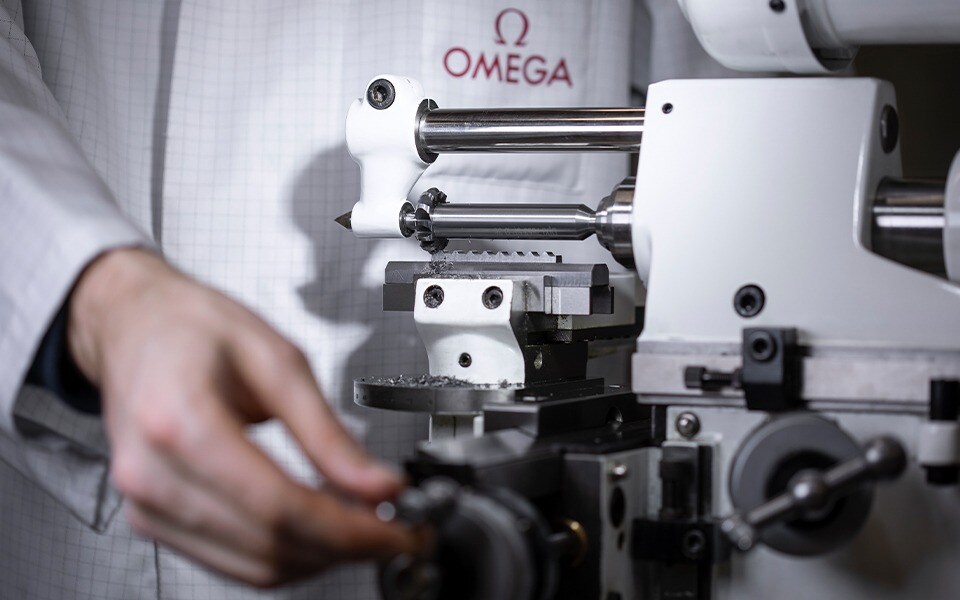
Horological advances
OMEGA has continued to bring key innovations to the industry, never forgetting the original goal of Louis Brandt when he began his watchmaking career: precision. OMEGA Master Chronometer certification is given only to those watches that survive each of eight tests established by METAS, the Federal Institute of Metrology, ranging from the function of movement to average of daily precision and water resistance. The results of all tests can be viewed by the watch’s owner via the OMEGA website.
Among OMEGA’s many game-changing inventions is the Co-Axial escapement, a design that reduces friction in the movement, resulting in superb long-term chronometric function. Launched in 1999, these chronometers are now achieving levels of accuracy previously unimagined for series-production mechanical watches. Many OMEGA models have proudly worn the prestigious Co-Axial Master Chronometer label on their dials since the Globemaster lead the way back in 2015.
Patenting their own materials
OMEGA has patented its own materials, two of which were first seen on the market in 2013. Sedna Gold ™ is the brand’s 18-carat rose-gold alloy, created by blending the brilliance of gold with palladium and copper. Named after the planetoid Sedna, the most distant object in the Solar System, the metal has a long-lasting lustre, and is three times harder than pure gold. The brand also spent years perfecting Ceragold™, which involves bonding of 18-carat gold in ceramic. The process includes extreme heating and submersion in a gold electrolytic bath for 48 hours, and the result is a ceramic bezel with a gold diving scale that is completely smooth to the touch.

